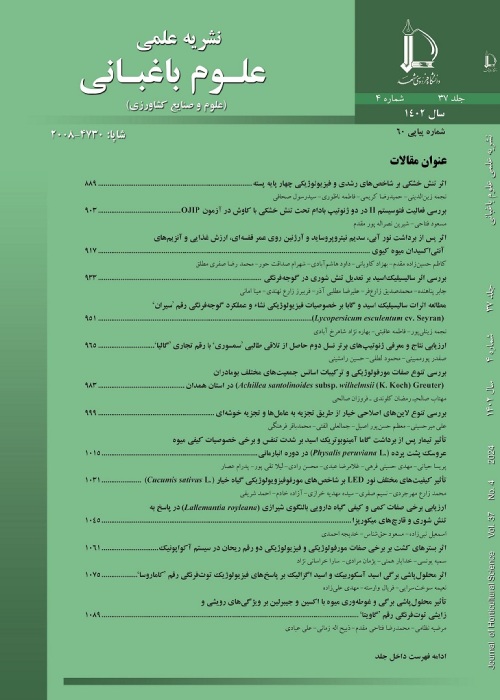Comparison of Antimicrobial Activity of Essential Oils and Plant Extracts with Recombinant Peptide in Controlling of Some Pathogens of Cultivated White Button Mushrooms
Author(s):
Article Type:
Research/Original Article (دارای رتبه معتبر)
Abstract:
Introduction
The most serious diseases of cultivated mushrooms are caused by Pseudomonas tolaasii and Trichoderma harzianum pathogens. A common method of pathogen control on farms worldwide is the application of various chemical pesticides. Many of these substances are unsafe for human and environment. The interest in discovering and developing natural antimicrobials has significantly increased due to consumer preferences for foods that are free of chemical residues. So, a major challenge for mushroom growers is to control diseases with alternative compounds such as essential oils and plant extracts. Antimicrobial peptides (AMPs) were also known as potential antibiotic and considered as a new antimicrobial agents. In the present study, the antibacterial and antifungal potential of essential oils, plant extracts and a recombinant peptide were investigated for their pathogenicity. For this purpose, the essential oils of Cuminum cyminum and Zataria multiflora and the plant extracts of Dorema ammoniacum and Ferulago angulata and a recombinant peptide were evaluated for their antimicrobial and antifungal effects on the P. tolaasii and T. harzianum pathogens.
Materials and Methods
In this study, essential oils of C. cyminum and Z. multiflora were extracted by hydrodistillation in a Clevenger-type apparatus. The plant extracts (D. ammoniacum and F. angulata) were prepared using maceration method. Recombinant peptides (Lactoferricin-Lactoferrampin) were produced from Adherent Human Embryonic Kidney 293 (HEK293). The antifungal properties of essential oils, plant extract and AMPs were studied on growth inhibition. Antibacterial activity of substances were tested against P. tolaasii via disk-diffusion method respectively. Minimum inhibitory concentration (MIC), Minimum bactericidal concentration (MBC) and Minimum fungicidal concentration (MFC) to the compounds were studied. All treatments were considered in a completely randomized block design with three replicates.
Results
The results of the antibacterial evaluations showed that the Chimera peptide have remarkable activity against pathogenic bacteria with a mean diameter of the zone inhibition region of 32.2mm, followed by C. cyminum and D. ammoniacum extracts with mean values of 7 and 6 mm respectively. Regarding to antifungal activity of substances isolated from above material, it was found that essential oils of C. cyminum and Z. multiflora completely prevent the growth of T. harzianum, followed by D. ammoniacum and F. angulate with maen values of 26 and 60.6 mm respectively. The lowest antifungal activity was observed for chimera peptide.
Discussion
The cultivated button mushroom is one of the most extensively cultivated mushroom in the world. The most serious diseases of cultivated mushrooms are caused by P. tolaasii and T. harzianum pathogens. The results of our study showed that the C. cyminum and D. ammoniacum have remarkable activity against pathogenic bacteria. Plant extracts, essential oils and their components have demonstrated strong fungistatic and antibacterial effects against pathogenic fungi and bacteria on cultivated mushrooms. Modes of action of essential oils in their interaction with bacteria have been quite revealed. It has been assumed that Thymol changes the permeability of cytoplasmic membrane of Gram-positive bacteria, acting as a proton exchanger, decreasing the pH gradient and causing a collapse of the proton motive force and eventually cell death. Regarding to antifungal activity, our results also showed that essential oils of C. cyminum and Z. multiflora completely prevent the growth of T. harzianum, followed by D. ammoniacum and F. angulate. One of the possible action mechanisms proposed that fungal growth may be reduced or totally inhibited due to monoterpenes present in essential oils which could increase the concentration of lipidic peroxides such as hydroxyl, alkoxyl and alkoperoxyl radicals and so bring about cell death. According to another mechanism, the essential oils would act on the hyphae of the mycelium, provoking exit of components from the cytoplasm, the loss of rigidity and integrity of the hypha cell wall, resulting in its collapse and death of the mycelium. In our study, a camel recombinant chimeric lactoferricin + lactoferrampin peptide was also tested for its antimicrobial activity. Our result showed that this recombinant peptide have remarkable activity against pathogenic bacteria. The details of the antibacterial mechanism for this recombinant peptide still are unknown. However, amino acid profile, sequence orientation and structural conformation of cationic peptides are the main features which make these peptides capable to inhibit bacterial growth by disrupting of the bacterial cell membrane. As a general results it can be concluded that natural plant-derived antimicrobial as well as recombinant peptides can be used as alternatives to synthetic pesticides, however, further studies on safety and toxicity of these substances should be carried out before use.
Conclusion
In summary, this study shows that essential oils and plant extracts isolated from above plant material have remarkable antifungal activities against T. harzianum, while the chimera peptide showed complete inhibition against P. tolaasii. Thus all of these substance could become alternative to synthetic antimicrobial compounds for control of mushroom pathogens. However, further studies on safety and toxicity of these substances should be carried out before use.Keywords:
Language:
Persian
Published:
Journal of horticulture science, Volume:32 Issue: 4, 2019
Pages:
615 to 628
magiran.com/p1944868
دانلود و مطالعه متن این مقاله با یکی از روشهای زیر امکان پذیر است:
اشتراک شخصی
با عضویت و پرداخت آنلاین حق اشتراک یکساله به مبلغ 1,390,000ريال میتوانید 70 عنوان مطلب دانلود کنید!
اشتراک سازمانی
به کتابخانه دانشگاه یا محل کار خود پیشنهاد کنید تا اشتراک سازمانی این پایگاه را برای دسترسی نامحدود همه کاربران به متن مطالب تهیه نمایند!
توجه!
- حق عضویت دریافتی صرف حمایت از نشریات عضو و نگهداری، تکمیل و توسعه مگیران میشود.
- پرداخت حق اشتراک و دانلود مقالات اجازه بازنشر آن در سایر رسانههای چاپی و دیجیتال را به کاربر نمیدهد.
In order to view content subscription is required
Personal subscription
Subscribe magiran.com for 70 € euros via PayPal and download 70 articles during a year.
Organization subscription
Please contact us to subscribe your university or library for unlimited access!


